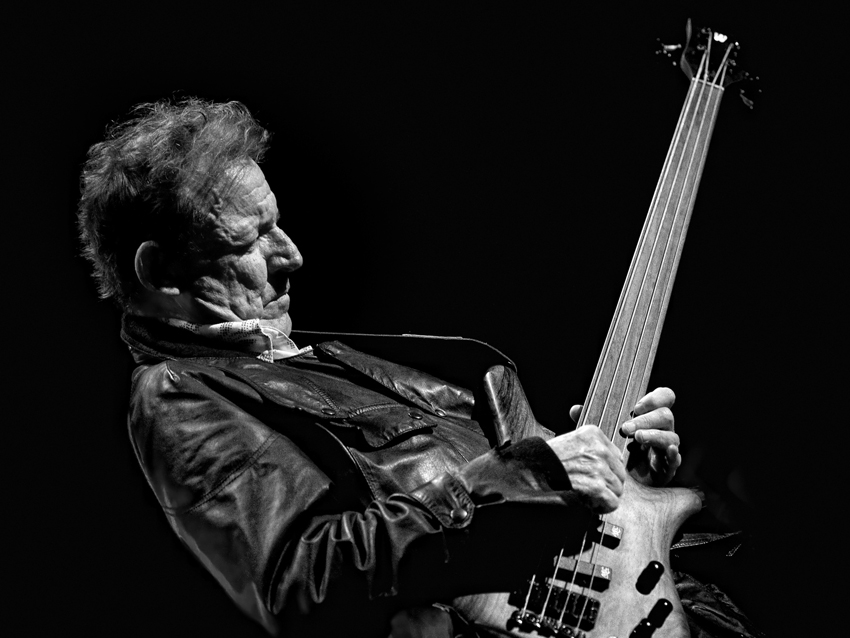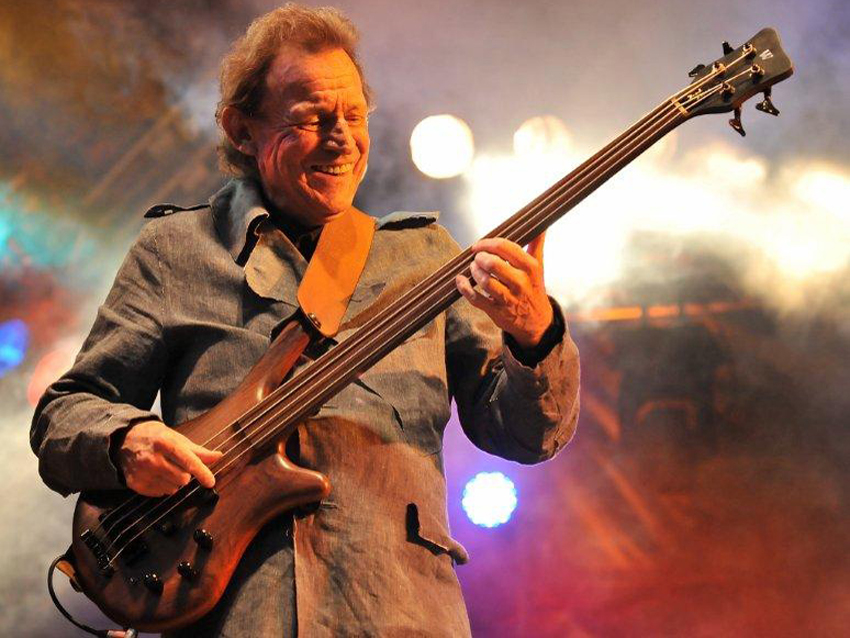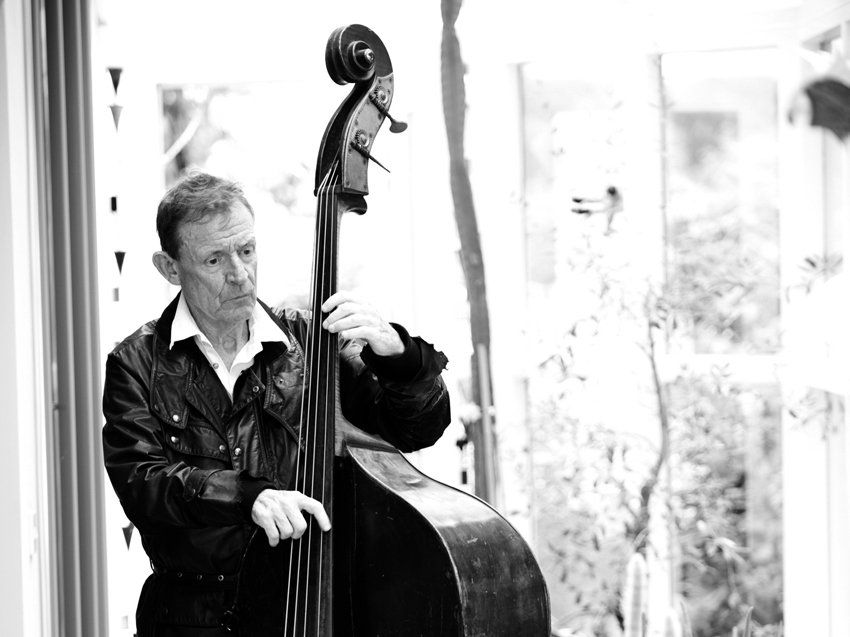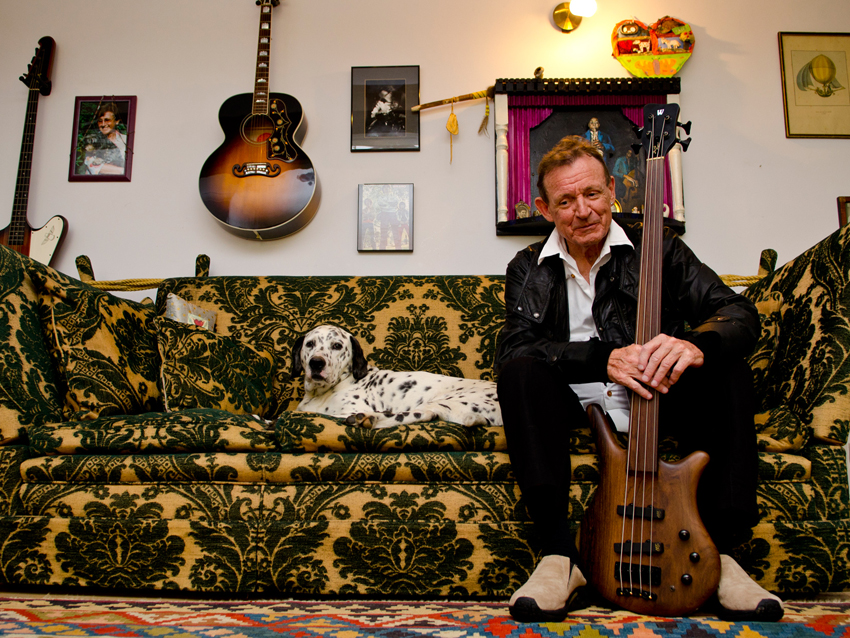Jack Bruce talks beloved basses, Baker and blowing speakers
In-depth with the Cream legend

Jack Bruce talks beloved basses, Baker and blowing speakers
What is there to say about Jack Bruce that's not already been said?
He's widely agreed to be one of the finest bassists to have walked the earth. Alongside Eric Clapton and Ginger Baker in Cream, he laid a blueprint for psychedelic and blues-based rock music, formed the prototype power trio and became one of the first stadium-filling rock stars.
No sideman, Bruce was also the writing force behind Sunshine Of Your Love, I Feel Free and White Room. Now he's back with his first solo album in 10 years, Silver Rails (due 24 March/15 April in the US).
We spoke to the Scottish Hall-Of-Famer to find out about the new record, his gear and his "completely unprofessional" time with Cream...
You recorded Silver Rails at Abbey Road. Even musicians of your own stature don't necessarily use such facilities any more. How did that come about?
"That's right, I was very lucky - I wasn't planning to record at Abbey Road. My daughter is a film-maker and I was at her premiere and the house producer of Abbey Road, Rob Cass, was also there. We got to talking and he said, 'Why don't you come and do your album at Abbey Road?'
"So I went down and had a look, as it had been a while - I recorded there in 1965, the first time - and they've really got it together there at the moment. They've got fantastic people and it's like working in a museum. They've got all of those old mics, but you know everything is going to work. Plus they've got all the latest gear... Although I'm ancient, I'm not against modern technology - I think it's pretty great."
Jack Bruce Silver Rails trailer
Click through our gallery for the rest of our interview...
For more information visit the official Jack Bruce website, Facebook and Twitter.

EB-3s and Hartke
What was your main bass gear for this record?
"I have three basses that I use for everything. I've got my Jack Bruce Signature Series from Warwick, which is a little bit like an EB-3, but it's a full-sized bass and very beautiful. It's fantastic, so I was using that just for normal fretted bass. Then I was using my beloved Warwick Brazilian Rosewood Thumb Bass, which is like my baby. Then I've got this Gibson EB-1 that I would be lost without and that's what's on Drone. It's just got this huge, huge sound - it's like a barn door, or something!"
What's your preference on the amplifier front?
"I'm still using the Hartke stuff, which was developed originally for me and Jaco Pastorius. The guys who did that, Larry Hartke and his partner, did sound for me for a while. They noticed that I was always blowing speakers, not because I play that loud –although I do - but because I'm a very physical player with quite a lot of attack in my playing, so that's what made them come up with the aluminium speaker cones - and they work for me."

The legacy of Cream
The Gibson EB-3 and Fender Bass VI will be forever associated with you. What drew you to those instruments at the time?
"I didn't really like the sound of Fenders [at first]. To me, it was a very standardised sound, and I felt that just about every Fender player in those days sounded the same, so I started looking for different things. I was in the Graham Bond band and the guitar player left, so I got the Fender VI, because I thought I could play little bits of solos on that.
"Once Cream started to happen, I wanted to find something that had a very particular kind of distorted sound, and that I could bend strings on, because I wanted to play it like a guitar - and the EB-3 was perfect for that. That got nicked in the '70s, though. It sort of appears from time to time and then disappears again, so there's this kind of on-going hunt to track it down and find the elusive EB-3!"
There's an impressive list of guest spots on Silver Rails, particularly guitarists - Robin Trower, Phil Manzanera, Uli Jon Roth. How did they become involved? Why them?
"I went to play in Cuba a couple of years ago with Phil, so when I wrote Candlelight - the words are written by my wife Margaret, I have to mention on pain of no dinner - I just heard Phil playing. He's one of my favourite guitar players. I really like his approach - it's unusual and it takes things to another level. [The same with Robin], as soon as I wrote Rusty Lady, that riff, I just felt, 'Well, that's Robin'.
"Then, Uli, I really was lucky, because I just wanted him. Hidden Cities is my sort of version of metal and he's got that amazing guitar with the extremely long neck and it just seemed right for him. He's such a great guy and so funny. I remember saying to him at the session something like, 'Maybe we should get back, because time is getting on' and he said: [adopts Uli gravitas] 'Time's a concept best not considered!' It was like, 'Alright Uli, fair enough!'"
You've collaborated with many great players. Which musician have you felt the strongest musical connection with throughout your career?
"I would have to say Cream was the strongest musical statement [of my career]. There's no getting away from that. It was, as Frank Zappa described it, 'A nifty little trio.' I think that sums it up really. I would say, with those guys, we brought out the best in each other.
"Then also working with [jazz drumming legend] Tony Williams' Lifetime. That was pretty astounding. But you get a lot of different things from different people. Working with Ringo [Starr], for instance. People say he's not a great drummer - I think he's a pretty fine drummer and he taught me a few things about actually being an entertainer."

Working with Mr Baker
Has the relationship between yourself, Eric Clapton and Ginger Baker as players changed much over time?
"Obviously, we're a lot older, but I don't think the actual way of playing together has changed too much. [Playing together again in 2005] we all adopted the same roles that we used to. The thing about Cream was that whoever's song it was at the time was the bandleader, so if Eric was doing a song like Badge, I would step to the background, because it was his song. Then the same thing would apply if I was doing White Room, he would very much support that. So I think we still had those same roles on stage, even all of those years later."
Beware Of Mr Baker trailer
Ginger Baker has had something of a revival thanks to the recent Beware Of Mr Baker documentary. Do you feel your relationship was represented fairly in the film?
"I haven't actually seen that film. When the director of the film [Jay Bulger] asked me to do it, I said, 'I'm not really into going over all of that old stuff again. It's been done.' But he arrived at my house and said, 'I just want to show you one scene from the film.' And I think you're going to know what the scene was that he showed me - it was when he'd got his nose broken by 'Mr Baker'.
"I felt so sorry for that guy. He explained that he'd spent months living with Ginger and I thought, 'Well, it would be so unfair if I wasn't in it [after all of that]'. So I said, 'Just come in and we'll do it.' So we did it. But I don't have to watch it! I had to live it, so I don't have to watch it [laughs]. I'm fine with Ginger, he can do his 'bah humbug' or whatever is his thing at the moment. I'm fine with it - I'm cool."

The shadow of the '60s
The music press has a habit of glamourising the '60s and '70s as an untouchable, golden period. What do you think of that mythologising of your life? Is it an accurate reflection?
"I don't think it's completely accurate, no. We were just making it up as we went along. It was completely unprofessional. We had no idea how to do a big gig. We were playing these baseball stadiums and we'd go up with a little PA and plug in and play.
"I think it was two guys to look after the equipment and one guy to look after the band! Then, when we did the Cream reunion [in 2005], I think it was 45 people in the crew. We used to just fly from one place to the next, rent a station wagon and drive to the gig - and the gigs were great.
"We were a little bit early - I think the '70s was when the real rock 'n' roll party happened. And I did take part in some of that with West, Bruce and Laing. But with the original thing, we were just on the road and if we had a couple of days, we'd go in and make an album. There were some very glamorous times - hanging out in Sausalito, the hippy summer and all of that, but it gets a bit overblown, I think."
Finally, given your achievements - artistic and commercial - and your many diverse collaborations, what keeps you motivated as a musician?
"That's a good question. I just love playing and I love music. Making an album like Silver Rails, it's a real team effort and I like being part of a team. It's not just me saying, 'You do this and you do that'. You get swept up in it. So I think it's partly that, but it's also the end product that I'm going for. If I can make a good album, then it makes it worthwhile. I'm not claiming to be anything except what I am. And what I love is to play and record and perform."
Matt is a freelance journalist who has spent the last decade interviewing musicians for the likes of Total Guitar, Guitarist, Guitar World, MusicRadar, NME.com, DJ Mag and Electronic Sound. In 2020, he launched CreativeMoney.co.uk, which aims to share the ideas that make creative lifestyles more sustainable. He plays guitar, but should not be allowed near your delay pedals.
